
On January 31, the Russian space agency Roscosmos announced the impact of cosmic radioactivity as the cause of the automatic interplanetary Station.
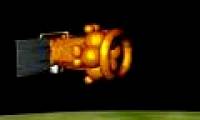
Russian scientists reported that the Phobos-Grunt spacecraft's debris had fallen into the Pacific on Sunday 15 October after failing to complete the mission to explore Mars.

The reporter in the Russian Federation led the news in the newspaper
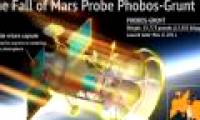
In the latest dramatic development of the failed Russian launch of the Phobos-Grunt, it seems that the US military has removed many links on a website that tracks the data about

A US State Department spokesman denied that the failed launch of Russia's Phobos-Grunt probe was caused by a powerful electromagnetic wave emitted by an American radar.

Russia admits the fragments of the Phobos-Grunt spacecraft will likely fall back to the ground next week.

On January 11, the Russian Federal Aeronautics Agency Roscosmos announced the debris of the Phobos-Grunt Automatic Interplanetary Station to probe Mars could fall to the Indian

The Russian probe Phobos-Grunt, trapped in Earth orbit, will fall to southwestern Afghanistan on January 14, 2012, according to the US Strategic Command's forecast.

Russia is still powerless in locating the Phobos-Grunt spacecraft, but an amateur astronomer happens to discover this black ship.

A source from the Russian space industry said there was little chance of saving the unmanned Russian spacecraft Phobos-Grunt launched on Mars.
 On January 31, the Russian space agency Roscosmos announced the impact of cosmic radioactivity as the cause of the automatic interplanetary Station.
On January 31, the Russian space agency Roscosmos announced the impact of cosmic radioactivity as the cause of the automatic interplanetary Station. Russian scientists reported that the Phobos-Grunt spacecraft's debris had fallen into the Pacific on Sunday 15 October after failing to complete the mission to explore Mars.
Russian scientists reported that the Phobos-Grunt spacecraft's debris had fallen into the Pacific on Sunday 15 October after failing to complete the mission to explore Mars. The reporter in the Russian Federation led the news in the newspaper
The reporter in the Russian Federation led the news in the newspaper In the latest dramatic development of the failed Russian launch of the Phobos-Grunt, it seems that the US military has removed many links on a website that tracks the data about
In the latest dramatic development of the failed Russian launch of the Phobos-Grunt, it seems that the US military has removed many links on a website that tracks the data about A US State Department spokesman denied that the failed launch of Russia's Phobos-Grunt probe was caused by a powerful electromagnetic wave emitted by an American radar.
A US State Department spokesman denied that the failed launch of Russia's Phobos-Grunt probe was caused by a powerful electromagnetic wave emitted by an American radar. Russia admits the fragments of the Phobos-Grunt spacecraft will likely fall back to the ground next week.
Russia admits the fragments of the Phobos-Grunt spacecraft will likely fall back to the ground next week. On January 11, the Russian Federal Aeronautics Agency Roscosmos announced the debris of the Phobos-Grunt Automatic Interplanetary Station to probe Mars could fall to the Indian
On January 11, the Russian Federal Aeronautics Agency Roscosmos announced the debris of the Phobos-Grunt Automatic Interplanetary Station to probe Mars could fall to the Indian The Russian probe Phobos-Grunt, trapped in Earth orbit, will fall to southwestern Afghanistan on January 14, 2012, according to the US Strategic Command's forecast.
The Russian probe Phobos-Grunt, trapped in Earth orbit, will fall to southwestern Afghanistan on January 14, 2012, according to the US Strategic Command's forecast. Russia is still powerless in locating the Phobos-Grunt spacecraft, but an amateur astronomer happens to discover this black ship.
Russia is still powerless in locating the Phobos-Grunt spacecraft, but an amateur astronomer happens to discover this black ship. A source from the Russian space industry said there was little chance of saving the unmanned Russian spacecraft Phobos-Grunt launched on Mars.
A source from the Russian space industry said there was little chance of saving the unmanned Russian spacecraft Phobos-Grunt launched on Mars.
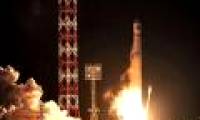
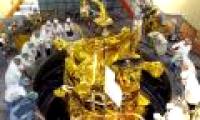
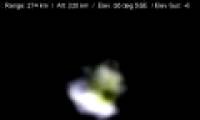

 NASA's 'Ninth Planet' Shows Signs of Being Friendly to Life
NASA's 'Ninth Planet' Shows Signs of Being Friendly to Life Why did American astronauts have to be quarantined when returning to Earth?
Why did American astronauts have to be quarantined when returning to Earth? China surprises the world by building a cable-stayed bridge 'above the clouds'
China surprises the world by building a cable-stayed bridge 'above the clouds' Why do women sleep less and wake up more than men?
Why do women sleep less and wake up more than men? Revealing the secret inside the stuffed animal claw machine, from there, summarizing experience to help you increase your winning rate many times over
Revealing the secret inside the stuffed animal claw machine, from there, summarizing experience to help you increase your winning rate many times over What would happen if you dug a hole through the Earth and jumped in?
What would happen if you dug a hole through the Earth and jumped in? Camera takes a photo that lasts 1,000 years
Camera takes a photo that lasts 1,000 years Was there nuclear war in ancient times?
Was there nuclear war in ancient times?